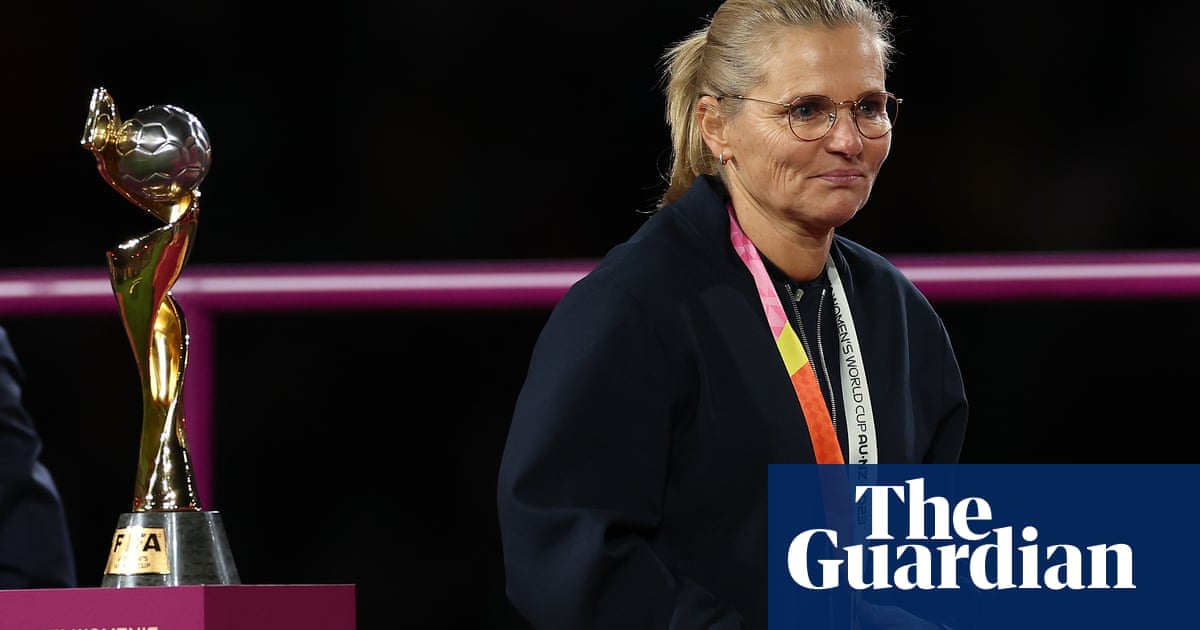
In 2014, Cambridge United played Gateshead in the National League play-off Final. Four minutes to go and we were 2-1 up when Ian Miller, our centre-back, went down with a broken ankle. We’d used all our subs. The referee played 10 minutes of injury time. TEN MINUTES. It felt about a year. Gateshead put a header just wide as the clock flicked to 99 minutes. My voice had gone. I could barely breathe. The relief at the final whistle is almost impossible to articulate.
Every fan recognises that agonising knot of nerves that goes beyond the pit of the stomach. It is overwhelming and all-consuming. Nothing else can give you that escapism – you are completely lost in the moment – but it’s very difficult to work out if it’s in any way enjoyable.
For men’s international football tournaments, my dull pain normally begins on the morning of the first England game, and doesn’t leave until whichever devastating method of exit we’ve chosen. All those walks to the penalty spot. Pearce, Batty, Southgate, Saka. Gazza’s outstretched boot. Waddle hitting the post. That Argentinian getting in the way of a certain Lineker equaliser.
The Euro 2020 final felt like a seminal moment – I was almost paralysed with nerves beforehand. I had always wondered how I’d feel if England reached a major final, and how I’d react, win or lose. It was remarkably undramatic. I woke up the next day and was already over it. Perhaps the scenes at Wembley beforehand had tarnished it. Perhaps I’m just not as fanatical as I thought. Perhaps working in football has taken away the magic a little. Perhaps it’s just that I’m getting older.
This Sunday is another chance for a lot of England fans to get their first experience of winning a major trophy. In the days leading up to it, we can watch Alessia Russo’s backheel and Georgia Stanway’s thunderbolt on loop, but an hour before the game against Germany, I wonder whether those same nerves will kick in.
They aren’t something you control and so far in this tournament haven’t emerged. England have swept me along. I love watching them – but with 10 minutes left against Spain, when we had been thoroughly outplayed, I didn’t feel the pain I felt when Croatia were supposed to be tired against the men in 2018. Before the Sweden semi-final I was completely relaxed.
I have agonised over why it feels different to me. Is it because there is some deep-seated sexism rooted in my subconscious? A legacy of growing up in the ’80s and ’90s where the notion of women playing football was a joke? The boys kicked a shoot size five around the green triangle on Tenison Road and the girls sat on the outside talking about stuff and listening to the Levellers or the Cure. If one of them kicked the ball back to us it was an event.
Advertisement
Hopefully it’s more nuanced than that. I don’t spend a lot of time covering the women’s game. Most of the players are relatively new to me. There isn’t a history of this team causing me pain – I don’t have a playlist of soul-shattering BBC montages I can recite word for word from the past four decades (Euro ’96, to Cast’s Walkaway, is still so tough). And Sarina Wiegman’s team are unerringly good, so it doesn’t feel like they’ll let me down.
The positive is my four-month-old son lying on the floor in front of me won’t grow up with a negative stereotype of women’s football. It will be the norm for him. He probably won’t constantly compare the women’s game to the men’s.
And maybe those comparisons are pointless. I sympathise with those who cover the women’s game week-in, week-out having to read articles – like this one – possibly oversimplifying women’s football, or trying to make some grand statement about what every result means.
But watching football is a constant comparison. Every match we watch we relate to what went before, so for those of us embedded in the men’s game it’s only natural to do the same. If someone hammers it in off the bar, I say “Tony Yeboah” before it’s bounced back up and hit the top of the net.
And there are parts of these Euros that feel refreshing – referees getting less abuse, fewer really dangerous challenges, the lack of that “tiny minority” of fans booing the knee, abusing the opposition or singing grim chants about human tragedy. It would be odd to watch this tournament and not notice the differences.
Advertisement
As a casual viewer, I may be doing the women’s game a grave disservice. Perhaps Wembley Way on Sunday will be another modern day coked-up Caravaggio: flares, arses, stormed barricades – the lot. And this isn’t to denigrate every part of the men’s game – this isn’t an either/or game. Neither is perfect, they can learn from each other, and they’re both entertaining, which ultimately is the point. Like Messi and Ronaldo, why can’t we just enjoy both?
Above it all, as Ian Wright said so powerfully at the end of the Sweden game, this has to translate into more girls getting the opportunity to play. According to the FA’s latest figures, only 63% of schools offer girls’ football in PE lessons and only 40% of schools offer girls regular extracurricular football.
I have friends and colleagues for whom this final feels like the end-point of years of sacrifice, struggle and love for the women’s game. I hope for them more than anything that England can do it. I’m happy to jump on that bandwagon and crucially to stay on it. And if the Germans beat us, at the very least we’ll get one more heartbreaking montage.












